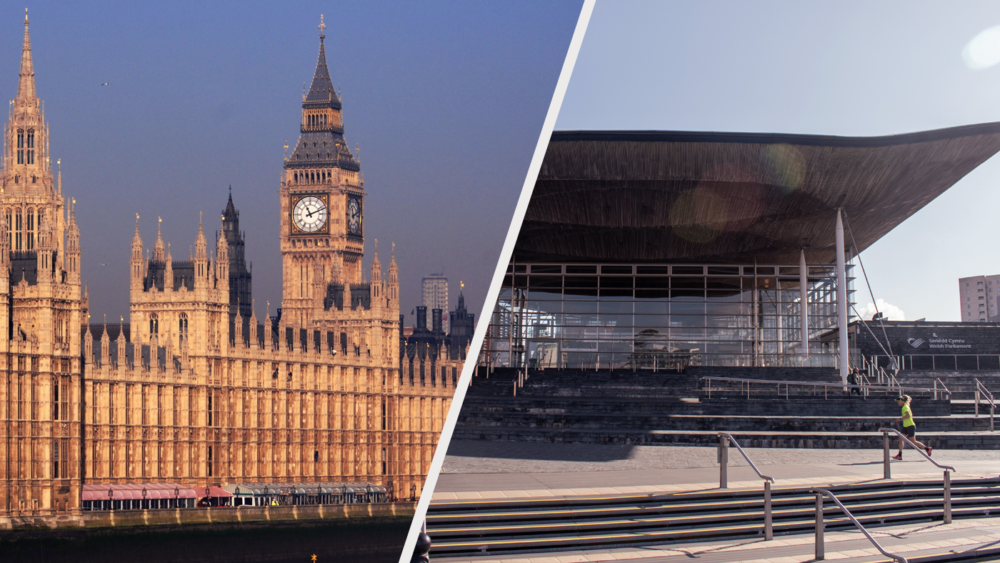Factcheck: which general election manifesto social housing pledges will apply in Wales?

This blog was updated on 24/06/2024 to reflect the announcement of party-specific Welsh manifestos.
The main UK political parties have now announced their manifestos ahead of the 2024 general election.
While specific housing pledges have been made, not all came with the necessary context for Wales - at least in the UK manifestos. Housing is a devolved issue here, which means that Welsh Government has responsibility for issues relating to housing - including social housing - and has the power to make laws relating to it.
Since the first version of this blog post was published, nearly all parties have launched Wales specific manifestos which go into more detail on how they see national pledges impacting the country.
In this updated analysis, our policy and external affairs manager Bethany Howells breaks down the main social housing manifesto policies, how there are proposed to apply to Wales - and why it matters.
Conservatives
The Conservative UK manifesto includes a range of commitments that link to social housing, such as the delivery of 1.6 million homes, introducing a Renters Reform Bill, legislating for new connection tests for social housing allocation, and legislating to evict social housing tenants who disrupt their neighbours after ‘three strikes’.
Welsh housing associations - which provide homes to 10% of the country’s population - take a different approach to evictions. For them, eviction has long been, and will continue to be, a last resort.
For the most part the manifesto is clear that these commitments will apply only in England, and the Conservatives have since launched a Wales-specific manifesto which includes a range of commitments to speed up housebuilding in Wales:
Increasing the capacity of housebuilding to complete 12,000 homes a year.
Speeding up the planning process by creating a joint action taskforce of planners and fast-tracking applications for affordable housing developments. A planner apprentice fund would also be introduced.
Developing a support scheme for SMEs.
Conducting surveys on all public authority land to determine suitability for housing.
Turn Wales’ 20,000 empty properties back into homes and expand Help to Buy to include those needing renovation.
Bringing back the right to buy in Wales (which ended in 2019).
Powers to amend housing and planning policies in Wales are devolved to the Welsh Parliament. Here, housing associations and local authorities are still working with Welsh Government to deliver 20,000 homes for an affordable rent this Senedd term, in line with projected need.
Labour
Labour’s UK manifesto commitments include a range of social housing-connected pledges to increase supply - for example building 1.5 million homes within five years, scrapping Section 21 ‘no fault’ evictions and strengthening planning.
It is important to note that under the Renting Homes (Wales) Act, the notice period for section 21 no fault evictions has already been extended to six months - but Welsh housing associations do not use this type of notice.
Labour has since launched its Welsh manifesto which highlights how the two Labour governments could work together “for Wales’ future”. The manifesto supports Welsh Labour’s housing ambitions including delivering 20,000 new homes for social rent, increasing land available for social housing, extending the Help to Buy scheme, and tackling second home ownership.
The manifesto also points to the joint working opportunities from having a Labour government in Westminster and a Welsh Labour government. The governments would work together to reform compulsory purchase compensation rules to improve land assembly and speed up site delivery. They also pledge to rebuild the capacity of planning departments.
Plaid Cymru
As the ‘party of Wales’, it is perhaps unsurprising that Plaid Cymru’s manifesto is more explicit in detailing where its pledges would apply. Commitments linked to Welsh social housing include:
Introduction of a Right to Adequate Housing (Wales) Bill in the Senedd, which would include powers to introduce rent controls and other market interventions to “make housing more affordable”.
Working with local authorities and housing associations to further develop Welsh local supply chains and skilled labour, as part of its Unnos policy.
Reforming the planning system so that “it is consistent with local needs and aspirations, rather than reflecting the interests of developers”.
Development of a plan to “deliver this significant expansion to meet local housing need”, accessing public and private funding streams and “working with communities to provide the correct mix of housing across Wales” which factors in local needs.
Looking to end homelessness in Wales using the Housing First model and rapid rehousing.
Liberal Democrats
While Liberal Democrats’ UK manifesto does include some references to housing policies applying to England - and includes direct actions aimed at social housing development - its main commitment directly references the UK:
“Increasing building of new homes to 380,000 a year across the UK, including 150,000 social homes a year, through new garden cities and community-led development of cities and towns.”
The Liberal Democrats party has reiterated this pledge in its Wales manifesto, citing that using Wales’s share of the resources that come from the Liberal Democrats’ plans, they will encourage Welsh Government to tackle the funding crisis facing local authorities, including by providing multi-year settlements, boosting the supply of social housing, and forging a long-term, cross-party agreement on social care.
Other commitments from this party linked to social housing in its UK manifesto include:
Delivering a fair deal for renters by immediately banning no-fault evictions, making three-year tenancies the default, and creating a national register of licensed landlords.
Giving local authorities, including National Park Authorities, the powers to end Right to Buy in their areas.
Funding local planning departments to improve planning outcomes and ensure housing is not built in areas of high flood risk without adequate mitigation, by allowing local authorities to set their own fees.
Encouraging development of existing brownfield sites with financial incentives and ensuring that affordable and social housing is included in these projects.
Protecting the rights of social renters by: proactively enforcing clear standards for homes that are socially rented, including strict time limits for repairs; and, fully recognising tenant panels so that renters have a voice in landlord governance.
While the party does not explicitly say that these additions would only apply to the UK or England, as these cross into devolved issues we can assume that they would be England-only.
Reform
The Reform manifesto states “Britain has a housing crisis", and goes on to detail “critical reforms needed in the first 100 days”, including:
Reviewing the planning system.
Reforming social housing law to “prioritise local people and those who have paid into the system”.
Abolishing the Renters’ (Reform) Bill.
Thereafter the party states it would incentivise new construction technology, amongst other plans.
Unlike the other main parties, Reform has not created a Wales-specific manifesto (to date). However further into its UK manifesto, Reform makes specific reference to Wales, saying it would, “reform the planning system and fast-track new housing on brownfield sites and infrastructure projects to boost businesses, especially in coastal regeneration areas, Wales, the North, and the Midlands”. Most aspects of planning are devolved in Wales, however.
Green Party
The Green Party is very specific in its promise to provide “fairer, greener homes for all” in its UK manifesto.
Its Welsh manifesto includes specific targets for Wales, such as:
Building at least 12, 000 new homes each year in Wales to solve the housing crisis.
Proposing a massive retrofit scheme to older housing to help reduce energy bills.
Strengthening rent controls in Wales including rent caps and ending zero fault evictions.
Supporting ‘Right to Rent’ for those struggling with mortgage payments.
These commitments echo the pledges contained in the Green UK manifesto, such as the commitment to “provide 150,000 new social homes every year” and pushing for a local authority-led, street by street retrofit programme to insulate our homes.
In Wales, registered social landlords are already working on a vast programme to decarbonise existing homes and build new energy efficient social housing. The Welsh Housing Quality Standard, introduced in October 2023, requires all registered social landlords to aim to achieve Energy Performance Certificate (EPC) Band A for each property it manages by March 2034.
What do English policies mean for Wales?
As the whole of the UK is facing a housing crisis, it is no surprise that housing is a key talking point for the forthcoming election. While many of the policies contained in the UK manifestos will not directly apply in Wales there may still be some boosts for the country if or when pledges are acted upon.
Commitments to reform planning systems, for example, may see funding boosts for councils in England. This means that there could be consequential funding for Wales and other devolved countries too.
Most parties have provided further detail on what these pledges mean for Wales in their Welsh manifestos. However, many of these commitments would still require support from the Welsh Parliament due to housing and planning policies being devolved to Wales.
Working with Welsh Government, registered social landlords in Wales - including housing associations - take on board best practice from around the world to ensure that the social housing system works for the people of Wales. While the country has already taken a different approach from England on several of the areas promised for action, it may well be that where things change for the better in England, it could inspire progression in Wales too.



